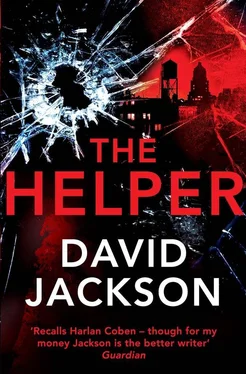David Jackson - The Helper
Здесь есть возможность читать онлайн «David Jackson - The Helper» весь текст электронной книги совершенно бесплатно (целиком полную версию без сокращений). В некоторых случаях можно слушать аудио, скачать через торрент в формате fb2 и присутствует краткое содержание. Год выпуска: 2012, ISBN: 2012, Издательство: Macmillan Publishers UK, Жанр: Триллер, на английском языке. Описание произведения, (предисловие) а так же отзывы посетителей доступны на портале библиотеки ЛибКат.
- Название:The Helper
- Автор:
- Издательство:Macmillan Publishers UK
- Жанр:
- Год:2012
- ISBN:9780230763159
- Рейтинг книги:3 / 5. Голосов: 1
-
Избранное:Добавить в избранное
- Отзывы:
-
Ваша оценка:
- 60
- 1
- 2
- 3
- 4
- 5
The Helper: краткое содержание, описание и аннотация
Предлагаем к чтению аннотацию, описание, краткое содержание или предисловие (зависит от того, что написал сам автор книги «The Helper»). Если вы не нашли необходимую информацию о книге — напишите в комментариях, мы постараемся отыскать её.
The Helper — читать онлайн бесплатно полную книгу (весь текст) целиком
Ниже представлен текст книги, разбитый по страницам. Система сохранения места последней прочитанной страницы, позволяет с удобством читать онлайн бесплатно книгу «The Helper», без необходимости каждый раз заново искать на чём Вы остановились. Поставьте закладку, и сможете в любой момент перейти на страницу, на которой закончили чтение.
Интервал:
Закладка:
Doyle tackles the flaming gasoline puddle in the center of the floor first, blasting it with the extinguisher more times than it needs. Then, slowly, he crosses the room to the remaining pyre. He takes aim with the extinguisher. Waits a few seconds. Waits a few more seconds. Then puts out the fire.
He looks down at the charred, sizzling mass. Wrinkles his nose at the smell of roasting flesh. Wonders why people do what they do.
Stepping back to Mrs Sachs, he chooses to leave her covered. It seems more fitting somehow. He wants to remember her as she was when he first met her. Aged, frail, but still with a spark of life. Still capable of flirting with him.
And then he thinks about what he said just minutes ago. About the emphatic way in which he asserted that her daughter was dead. That was the trigger. That was what made her realize that her life was no longer worth living. And it was what saved his own.
And all the other victims. Dead not because of what they did or what they desired, but because of what they said.
Such is the power of words.
THIRTY-ONE
Of course, he tells them everything.
When they arrive in droves — the cops, the medics, the fire department — he tells them all he knows.
He tells them how he got a phone call from Mrs Sachs, saying that she wanted to talk with him about her problems with Repp, and that when he got to her house he was confronted by this madman, who had forced Mrs Sachs to make the call and who was now intending to kill both her and Doyle. He tells them how the guy was screaming that this was to teach Doyle to stop poking his nose in where it didn’t belong.
They ask Doyle what the perp meant by that. He tells them he doesn’t know. It doesn’t make any sense.
And when he has said all this he has to swallow down the sour taste it leaves in his mouth.
In the hours that follow, the bodies are examined. Partly melted credit cards are found in the man’s wallet. Enough to identify him.
His name is John Everett.
The investigating detectives search Everett’s house in Queens, and what do you know? They find detailed notes on a number of people who have been murdered in the city recently. Notes about where they lived, their likes and dislikes, their personal habits, their daily schedules, and so on. Especially noteworthy is information on how these people indicated their desire to end their miserable existence.
Well, well, well, the detectives say. Isn’t it funny the way things pan out sometimes? Turns out that Detective Doyle’s theory wasn’t so wacky after all. And if Doyle hadn’t kept plugging away at it, maybe the killer would never have showed himself like he did.
So what the cops get is an instant clearance of several unexplained homicides and a perp they don’t even need to prosecute, seeing as how he’s been burnt to a cinder. Everyone in the NYPD is happy.
Everyone, that is, except Callum Doyle.
He’s tempted to let it go. As time passes and the evidence against Everett continues to stack up, Doyle is sorely tempted to accept that the cases are solved and that he should move on with his life.
The investigators find a pair of shoes in Everett’s bedroom that match up with footprints left on Vasey’s wooden floor. They find a leather biker’s jacket with a tag missing from one of the sleeve zips, the tag having been found in the bathroom where Helena Colquitt was drowned. Fingerprints found on the SUV used to kill Lorna Bonnow match those found all over Everett’s house. The shotgun used to kill Hanrahan is also found at Everett’s place. And when photographs of Everett start to appear in the media, several people come forward to say that they saw him near the scenes of crime, one of those helpful citizens being the owner of Peppe’s Pizza Piazza , who says he served Everett not long before Helena Colquitt was murdered.
There seems no doubt about it. The evidence is too overwhelming. Everett murdered all those people. Case closed.
Well. . maybe it’s still open a crack. For Doyle, at least.
For one thing, how did Everett get to know so much about his victims? Has anyone even tried to explain that? Some of those details were intimate, personal things. How did he find them out? Hanrahan wouldn’t have gone around telling everyone he met that he was thinking of swallowing his piece. Tabitha said that she told only Mrs Serafinowicz and Doyle that she considered suicide. Vasey was too worried about his reputation to have gone blabbing that he threatened to hang himself in a pathetic effort to win back his wife.
How did Everett discover all this information about his victims? Did he know them? Did he work with them in some way?
And then of course, there’s the glaring omission from Everett’s otherwise detailed notes.
Doyle himself.
The man on the phone knew a heck of a lot about Doyle. The names of his wife and child. Where he was born. Being abandoned by his father. His phone numbers. Even that he was working on a case involving Mrs Sachs.
So where’s all that in the notes? Doyle doesn’t get so much as a mention.
In a way he’s glad, because it would have meant answering a lot of awkward questions. But still, it seems curious that he’s not in there.
All these things he could probably overlook. With a little effort he could dismiss them with a remark such as, ‘I guess I’ll never know.’ And, over time, he would come to forget the unexplained and just be happy that he, Callum Doyle, was responsible for stopping a serial killer.
He could do all this were it not for one problem. The gnawing problem that keeps him awake at nights:
The voice of Everett that he heard in Mrs Sachs’s home is not the same voice he heard delivering clues to him over the telephone.
He has tried telling himself he must be imagining things, that he is looking for demons that cannot possibly be there. Voices sound different on the phone. At Mrs Sachs’s house the adrenalin was free-flowing: the way Everett spoke then was probably nothing like his usual speaking voice, and Doyle was not exactly calm enough at the time to analyze the guy’s speech patterns. So he tells himself he should forget it. He’s chasing shadows.
But Doyle doesn’t always believe what he tells himself. The voices were different. He’d bet his life on it.
So what does that mean?
Everett was the killer. Doyle believes that much. But if Everett wasn’t giving Doyle all those clues, then who was? And why? The caller never claimed to be the murderer; Doyle simply made the assumption that he was. It was a natural enough inference: the man knew so much about those already deceased and those about to die. Who else but the killer could know those things?
Someone did. He knew many things about many people.
So how?
Thinks Doyle, I don’t have a fucking clue.
Three days after the death of Everett, Doyle is on a job that involves a trip to One Police Plaza. Before he leaves, he takes the elevator up to the eleventh floor. As he steps through the doors he bumps into Lonnie Adelman. The CCS detective is carrying a huge wad of documents under one arm, and his characteristically flushed face is that of a man who has just done a hundred-meter sprint to catch a bus, rather than that of someone who has merely walked along a corridor.
‘Cal! Hey, man, how’s it going? Nice work on the serial killer thing. Seems like I can’t read a newspaper these days without seeing your ugly mug staring out at me. You got the paparazzi following you around yet?’
Doyle shrugs. ‘I got lucky. Right place at the right time. The press are making it into more than it was. To be honest, I’m not sure all this coverage is good for me.’
‘Sure it is. And you deserve it too. Luck, my ass. From what I heard, you’re the only one who had the balls to push the serial killer angle.’ He drops his voice to a conspiratorial whisper. ‘Frankly, if it wasn’t for you, the white shirts would still be scratching their heads and crying over their COMPSTAT figures.’
Читать дальшеИнтервал:
Закладка:
Похожие книги на «The Helper»
Представляем Вашему вниманию похожие книги на «The Helper» списком для выбора. Мы отобрали схожую по названию и смыслу литературу в надежде предоставить читателям больше вариантов отыскать новые, интересные, ещё непрочитанные произведения.
Обсуждение, отзывы о книге «The Helper» и просто собственные мнения читателей. Оставьте ваши комментарии, напишите, что Вы думаете о произведении, его смысле или главных героях. Укажите что конкретно понравилось, а что нет, и почему Вы так считаете.












